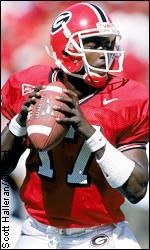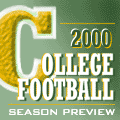| | By Wayne Drehs
ESPN.com
More and more, college athletes are learning that Bo Jackson and Deion Sanders were more the exceptions than the rule.
Jackson and Sanders, who became famous in the early 1990s for their success in professional baseball and football, made an All-Star multi-sport career look easy. Sometimes, Sanders would even hop in a private jet after a Saturday game with the Cincinnati Reds, just to start Sunday for the Atlanta Falcons.
|  | | Georgia's Quincy Carter passed on playing in the Cubs' organization this summer to concentrate on football. |
Today's multi-sport athletes aren't nearly as successful. Most realize the challenge is too much and pick one sport to concentrate on. Take the case of former Miami quarterback Kenny Kelly, who couldn't cut the two-sport hack and left the Hurricanes after last season to chase his baseball dreams with the Tampa Bay Devil Rays. He's now listed as one of the organization's Top 10 prospects.
There's also Georgia quarterback Quincy Carter, who did just the opposite of Kelly. Carter, who played minor-league baseball with the Cubs organization, walked off the diamond three at-bats into the 1999 season, quitting baseball and instead shifting his focus toward winning both the SEC and the Heisman Trophy.
New Orleans Saints running back Ricky Williams dropped minor-league baseball the summer before winning the Heisman and setting the NCAA career rushing record. And Florida State senior quarterback Chris Weinke tried his hand at baseball for seven seasons in the minors before becoming a Seminole.
With all this indecision, it's often the professional organization or the university athletics program that gets left empty-handed when a decision is finally made. Still, both sides agree these high-ceiling talents are often worth the risks. Michigan coach Lloyd Carr, who will start two-sport phenom Drew Henson at quarterback this fall, is one of the supporters of multi-sport athletes.
"When we recruit a player, I always like a guy who can play other sports," Carr said. "They are competing throughout the year, they are training and being coached. The competition, the getting ready, the pressure, the media -- all those things, they toughen you."
Cincinnati Reds scout Gary Hughes knows all about two-sport aspirations. Hughes signed John Elway, then an All-Pac-10 Stanford quarterback, to his first major-league baseball contract with the Yankees in 1981. He also signed Josh Booty, who won a World Series ring with the Marlins in 1997, but struggled after that. Booty gave up baseball in 1999, and now the 25-year-old junior is battling for the starting quarterback job at LSU.
Hughes now oversees the growth of Henson, whom the Reds acquired in a July trade with the Yankees for Denny Neagle. The Yankees were concerned with Henson possibly choosing football over baseball professionally. The Reds are gambling he won't, but Hughes sees nothing but upside for Henson and other two-sport stars.
"I love 'em. They're very special people," Hughes said of two-sport stars. "I was kidding with John (Elway) just last week, telling him, 'You know, if you would have stuck with baseball, you'd still be playing.'
"These are guys who have options and there's nothing you can do about that. Their god-given ability has given them these options, and that's great for them. So all you can do is support them in whatever they want."
Joe Borchard is one of the latest entries into the two-sport mainstream. Borchard, expected to be the starting quarterback for Stanford this fall, was the 12th pick of the Chicago White Sox in June's Amateur Baseball Draft. White Sox scouting director Duane Shaffer has compared Borchard's power at this point in his career to a young Mark McGwire and signed him for a $5.3 million signing bonus.
Others who have tried the two-sport lifestyle but then decided otherwise include Indiana quarterback Antwaan Randle El, Cincinnati Bengals quarterback Akili Smith, and White Sox first baseman Frank Thomas.
Then, there is the unusual case of Virginia Tech's Michael Vick. The Colorado Rockies fell in love with Vick's athletic ability, took a flyer and selected him late in the draft. Vick listened, but ultimately decided his future was on the football field.
Critics of the two-sport lifestyle say the athletes are more prone to injury, and they rarely reach their full potential since they are stretching their time too thin. Examples? Jackson and former Florida quarterback Doug Johnson. A hip injury in football ended the two-sport career of Jackson, while Johnson never reached his potential in baseball or football. He played both sports his first two years with the Gators, then just football his junior and senior season. But an injured shoulder limited his success on the gridiron.
"The growth of many of these players is stunted by doing this," Hughes said. "But you have to realize that many of them make up for that by being such a specially talented brand of athlete. None of this is a big mystery. You just say to them, 'go play football, or do whatever you want to do,' then you wish them the best of luck and hope they don't get hurt."
Wayne Drehs is a staff writer at ESPN.com. | |
ALSO SEE
Former Blue Jay Weinke flying high at FSU
|


